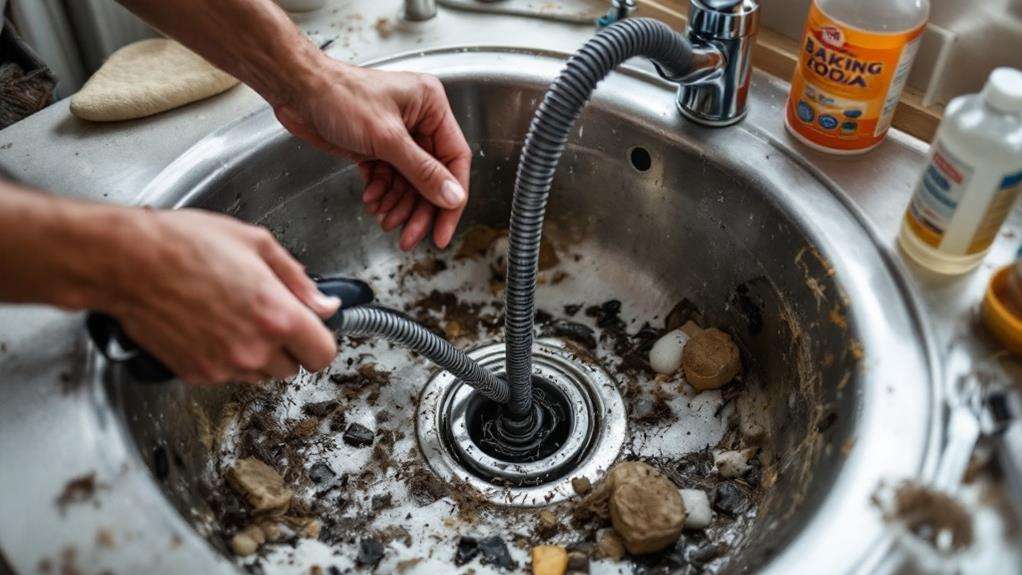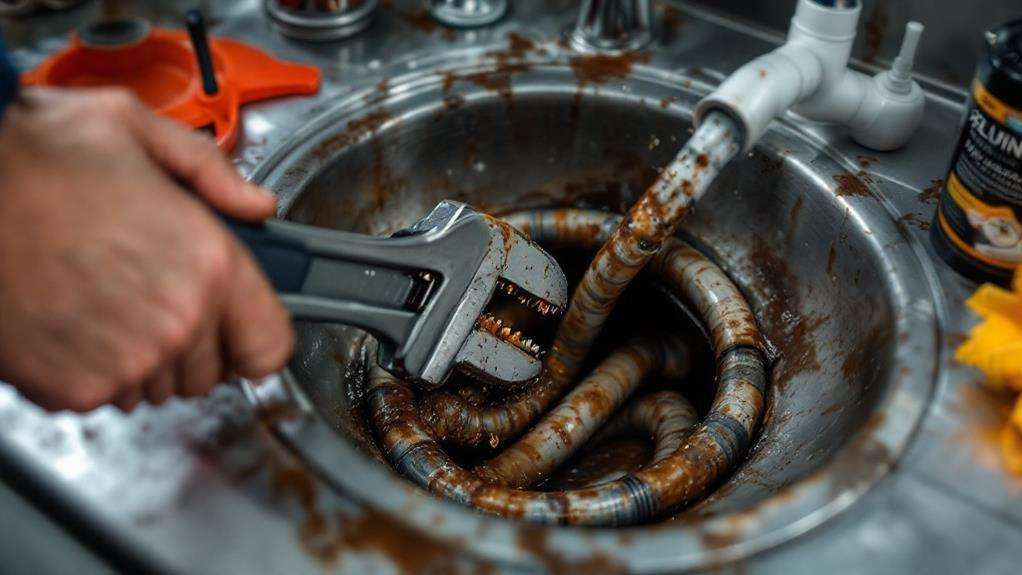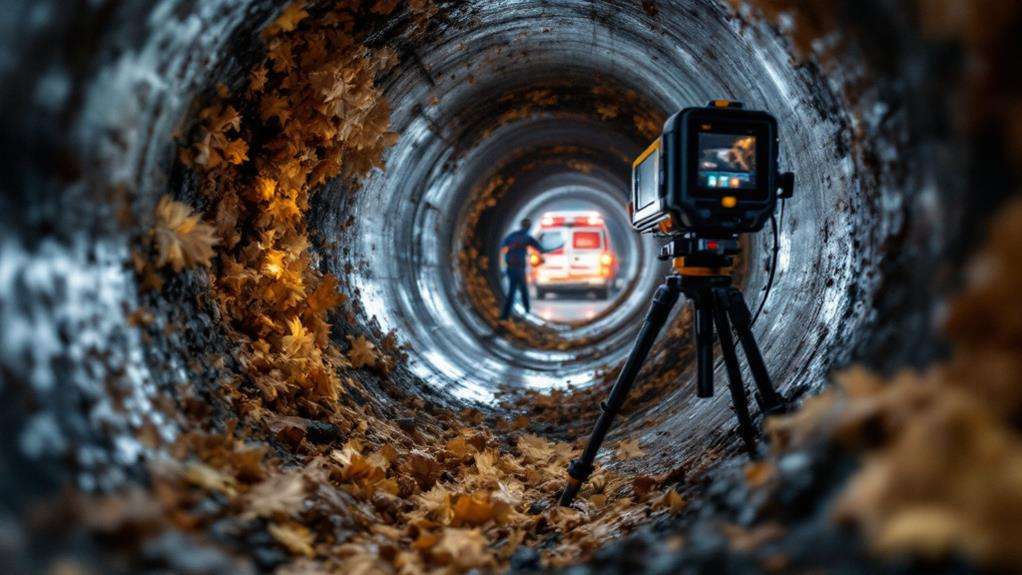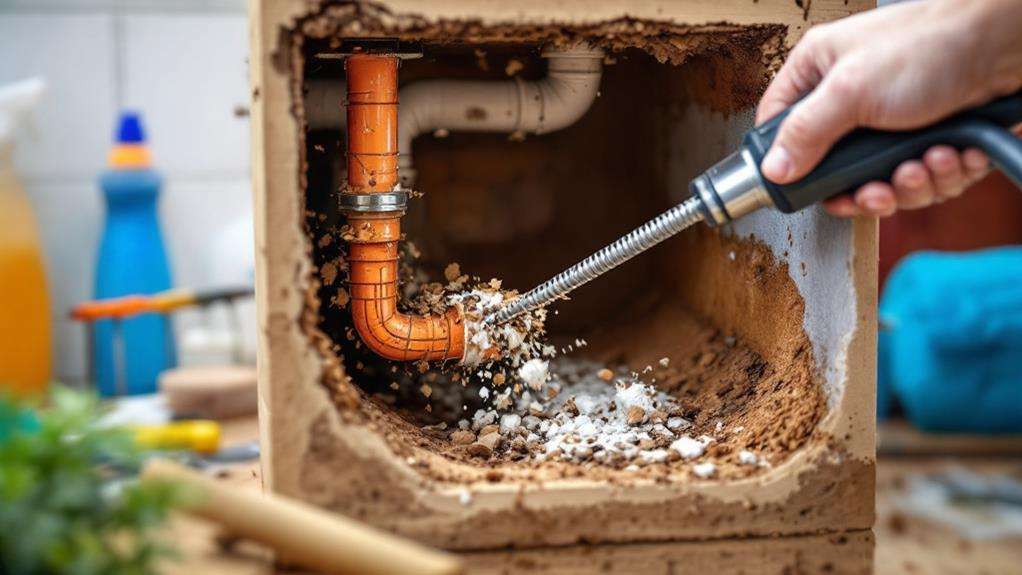Identifying Pipe Blockages and How to Clear Them
You can identify pipe blockages through slow drainage, gurgling sounds, and unpleasant odors from drains. Common culprits include hair, soap scum, grease, and mineral deposits. To clear minor clogs, try pouring boiling water down the drain, using a plunger, or mixing baking soda and vinegar. For stubborn blockages, consider using a drain snake or chemical cleaners, but always wear protective gear. Prevent future issues by being mindful of what goes down your drains and using drain screens. If DIY methods fail or you suspect a main sewer line blockage, it's time to call a professional plumber. Uncover more effective ways to keep your pipes flowing smoothly.
Common Signs of Pipe Blockages
Telltale signs often alert homeowners to potential pipe blockages before they become major issues. If you've noticed slow drainage in your sinks, showers, or bathtubs, it's a clear indicator that something's obstructing your pipes. Water should flow freely down the drain; if it's lingering or taking longer than usual to disappear, you're likely dealing with a blockage.
Listen carefully for gurgling sounds coming from your drains. These noises occur when air bubbles are trapped in the pipes, struggling to escape past the blockage. You might hear these sounds even when you're not using the affected fixture, as water from other sources tries to traverse the obstruction.
Unpleasant odors emanating from drains are another red flag. As debris accumulates in the pipes, it can create a foul smell that wafts back up through the drain. You may also notice water backing up in unexpected places, such as your shower filling up while you're running the washing machine. Multiple slow-draining fixtures often point to a more severe blockage in your main sewer line, requiring immediate attention to prevent potential flooding or sewage backups.
Types of Pipe Blockages
Understanding the different types of pipe blockages can help you address the problem more effectively. The most common type is caused by a buildup in pipes of organic matter like hair, soap scum, and food particles. These accumulate over time, gradually narrowing the pipe's diameter and restricting water flow.
Another frequent culprit is mineral deposits, especially in areas with hard water. Calcium and magnesium can form scale inside pipes, leading to reduced water pressure changes and eventual blockages. Tree roots can also infiltrate underground pipes, causing severe obstructions and potential pipe damage.
Foreign objects flushed down toilets or drains, such as toys, hygiene products, or excessive toilet paper, can create immediate blockages. Grease and oil solidification in kitchen pipes is another common issue, as these substances cool and harden, trapping other debris.
In colder climates, frozen pipes can cause blockages and potential pipe bursts. Lastly, pipe collapse or misalignment due to ground shifting or aging infrastructure can lead to chronic blockage issues. Identifying the specific type of blockage you're dealing with is vital for choosing the most appropriate clearing method.
DIY Methods for Clearing Clogs

For minor clogs, several DIY methods can effectively clear your pipes without calling a professional. Start with the simplest solution: boiling water. Pour it slowly down the drain to dissolve grease and soap residue. If that doesn't work, try a plunger. Create a tight seal around the drain and pump vigorously to dislodge the blockage.
For eco-friendly methods, mix baking soda and vinegar. Pour 1/2 cup of baking soda down the drain, followed by 1/2 cup of vinegar. Cover the drain and let it sit for an hour before flushing with hot water. This natural remedy can break down many types of clogs.
A drain snake or auger is another effective tool. Insert it into the drain and twist to catch or break up the obstruction. For sinks, you can also remove and clean the P-trap, the curved pipe section under the sink.
If you're dealing with a toilet clog, use a toilet plunger or a toilet auger. Remember to never use chemical drain cleaners, as they can damage your pipes and harm the environment. If these DIY methods don't work, it's time to call a professional plumber.
Chemical Solutions for Blockages
In spite of the environmental concerns, chemical drain cleaners remain a popular solution for pipe blockages. These potent formulas can quickly dissolve hair, grease, and other common clog-causing materials. However, it's essential to use them sparingly and follow the instructions carefully to avoid damaging your pipes or harming the environment.
When selecting a chemical drain cleaner, you'll find two main types: alkaline and acidic. Alkaline cleaners work well on organic matter like hair and food particles, while acidic cleaners are better suited for mineral buildup and scale. Be sure to choose the right type for your specific blockage.
If you're concerned about the environmental impact, consider eco-friendly pipe cleaners. These products use enzymes or bacteria to break down organic matter, offering a gentler alternative to harsh chemicals. While they may take longer to work, they're safer for your pipes and the environment.
Remember to always wear protective gear when handling chemical drain cleaners, and never mix different products, as this can create dangerous fumes. If the blockage persists after using chemical solutions, it's time to call a professional plumber.
Mechanical Tools for Stubborn Clogs

While chemical solutions can be effective, sometimes you'll need to get hands-on with mechanical tools to tackle stubborn clogs. For tougher blockages, consider using a plumber's snake or drain auger. These flexible, coiled wires can be manually inserted into pipes to break up or retrieve obstructions. They're particularly useful for clearing hair and debris from shower and sink drains.
For more persistent clogs, power auger tools and motorized drain cleaners offer increased efficiency. These electric-powered devices feature long, flexible cables with various attachments designed to cut through and remove stubborn blockages. They're especially effective for clearing tree roots from sewer lines or addressing severe buildup in kitchen sink drains.
When using mechanical tools, always wear protective gear and follow the manufacturer's instructions carefully. Start with the gentlest method and gradually increase force if needed. For toilet clogs, a toilet auger or closet auger is specifically designed to maneuver the bowl's curves without damaging the porcelain. Remember, if you're uncomfortable using these tools or the clog persists, it's best to call a professional plumber to avoid potential damage to your pipes.
Preventing Future Pipe Blockages
Prevention is key when it comes to pipe blockages. By implementing proactive maintenance strategies, you'll reduce the likelihood of clogs and extend the life of your plumbing system. Start by being mindful of what goes down your drains. Avoid disposing of grease, coffee grounds, and fibrous materials in kitchen sinks. In bathrooms, use drain screens to catch hair and debris.
Regularly flush your drains with hot water to help dissolve buildup and keep pipes clear. Once a month, pour a mixture of baking soda and vinegar down drains, followed by hot water after 15 minutes. This natural solution helps break down residue and maintain clean pipes.
Schedule routine plumbing inspections with a professional to catch potential issues early. They can identify developing problems and recommend appropriate solutions before they escalate. Consider having your pipes cleaned annually using hydro-jetting or snaking methods to remove accumulated debris.
Install water softeners if you live in an area with hard water, as mineral deposits can contribute to pipe blockages. Ultimately, educate household members about proper drain usage and encourage them to report any slow-draining sinks or unusual odors promptly.
When to Call a Professional

Red flags signal when it's time to call a professional plumber for pipe blockages. You should know when to hire a plumber if you've exhausted your DIY efforts and the problem persists. Recognize when to call for professional help by considering the severity and duration of the blockage.
Some signs that indicate you need skilled assistance include:
- Multiple drains clogging simultaneously
- Foul odors emanating from drains or pipes
- Gurgling sounds coming from toilets or sinks
- Water backing up into other fixtures
- Slow drainage throughout your home
If you've tried plunging, snaking, or chemical cleaners without success, it's time to seek professional help. Plumbers have specialized tools and knowledge to tackle complex blockages that may be beyond your reach. They can also identify underlying issues that might be causing recurring problems.
Don't hesitate to call a plumber if you suspect a main sewer line blockage or if you're dealing with old, fragile pipes. Attempting to clear these on your own could lead to costly damage. Remember, timely professional intervention can save you money and prevent more severe plumbing issues in the long run.
Addressing Outdoor Pipe Blockages
Facing outdoor pipe blockages presents unique challenges compared to indoor plumbing issues. You'll need to ponder factors like soil composition, tree roots, and weather conditions when addressing these problems. Start by examining rainwater drainage issues, as clogged gutters or downspouts can lead to water backing up and causing damage to your home's foundation.
When troubleshooting underground pipe problems, look for signs of blockages such as soggy areas in your yard, foul odors, or slow draining fixtures. You can use a plumbing snake or hydro-jetting equipment to clear minor blockages in outdoor pipes. For more severe cases, you might need to excavate the affected area to access and repair the pipe.
Tree roots are a common cause of outdoor pipe blockages. If you suspect root intrusion, mull using a root killer solution or hiring a professional to remove the roots and repair the pipe. Regular maintenance, such as cleaning gutters and inspecting visible outdoor pipes, can help prevent blockages. Additionally, be mindful of what you're flushing or washing down drains, as certain materials can accumulate and cause clogs in outdoor pipes over time.
Maintaining Your Plumbing System

While addressing blockages is important, the best way to avoid plumbing headaches is through regular maintenance. Proper maintenance techniques and routine inspections can substantially extend the life of your plumbing system and prevent costly repairs. You'll want to establish a maintenance schedule that includes checking for leaks, inspecting visible pipes, and monitoring water pressure.
To keep your plumbing in top shape, follow these key steps:
- Flush your water heater annually to remove sediment buildup
- Clean faucet aerators and showerheads regularly to prevent mineral deposits
- Test your sump pump every few months to guarantee it's working properly
- Inspect exposed pipes for signs of corrosion or damage
- Clean your gutters and downspouts to prevent outdoor drainage issues
Don't forget to pay attention to your daily habits, too. Avoid flushing non-biodegradable items, use strainers in sinks to catch debris, and be mindful of what you put down your garbage disposal. If you're not comfortable performing these tasks yourself, consider hiring a professional plumber for annual inspections. They can spot potential issues before they become major problems and provide expert advice on maintaining your specific plumbing system.
